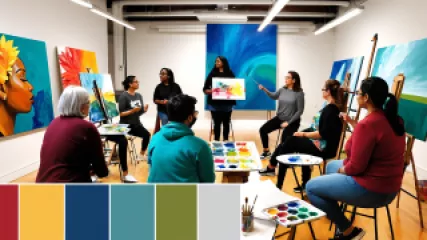How can art workshops improve mental health?
Art has long been recognized for its therapeutic benefits, and art workshops have gained popularity as a means of improving mental health. Whether it's through painting, drawing, or any other form of artistic expression, engaging in art workshops can provide a powerful avenue for healing, self-discovery, and personal growth. In this article, we will explore the ways in which art workshops can improve mental health and discuss the various techniques used in artistic meditation for healing.
1. Art Therapy for Depression
Depression is a complex mental health condition that affects millions of people worldwide. While there are various treatment options available, art therapy has emerged as an effective approach for alleviating symptoms of depression and promoting overall well-being.
Art workshops provide a safe and non-judgmental space for individuals to express their emotions and explore their inner world through creative means. The act of creating art can be cathartic and can help individuals process and release negative emotions. By engaging in art therapy, individuals with depression can gain a sense of empowerment and control over their emotions, leading to improved mood and a greater sense of self-worth.
Furthermore, art therapy can serve as a valuable tool for identifying and addressing underlying issues that may contribute to depression. Through the creation of art, individuals may uncover subconscious thoughts and feelings, allowing for greater self-awareness and the opportunity for personal growth.
2. Art Workshops for Mental Health
Art workshops specifically designed for mental health purposes offer structured activities and guidance from trained professionals. These workshops provide a supportive environment where participants can engage in artistic expression while also receiving therapeutic support.
Art workshops for mental health often incorporate various techniques such as collage making, journaling, and painting. These activities encourage participants to explore their emotions, reflect on their experiences, and develop coping strategies for managing stress and anxiety.
One of the key benefits of art workshops for mental health is the opportunity for social connection and support. Group workshops allow individuals to share their experiences, learn from others, and develop a sense of belonging. The collaborative nature of art workshops fosters a supportive community where participants can feel validated and understood.
3. Art Therapy for Self-Discovery
Art therapy goes beyond simply improving mental health; it also offers a powerful avenue for self-discovery and personal growth. Through the process of creating art, individuals can tap into their subconscious mind and gain insights into their thoughts, feelings, and desires.
Art therapists often use techniques such as mandala drawing, dream interpretation, and guided imagery to facilitate self-exploration. These methods encourage individuals to delve deeper into their psyche and uncover hidden aspects of themselves.
By engaging in art therapy for self-discovery, individuals can gain a better understanding of their strengths, weaknesses, and values. This self-awareness can lead to increased self-confidence, improved decision-making skills, and a greater sense of purpose.
4. Artistic Meditation for Healing
Artistic meditation combines the benefits of meditation with the creative process of making art. It involves focusing one's attention on the act of creating, allowing for a meditative state of mind.
During artistic meditation, individuals can experience a sense of flow, where they become fully immersed in the creative process. This state of flow promotes relaxation, reduces stress, and enhances overall well-being.
Artistic meditation can take various forms, such as painting, sculpting, or even coloring. The repetitive and rhythmic motions involved in these activities can induce a meditative state, similar to traditional forms of meditation.
Engaging in artistic meditation for healing allows individuals to quiet their minds, tap into their creativity, and find solace in the present moment. It provides a respite from daily stressors and fosters a sense of calm and inner peace.
Conclusion
Art workshops have the potential to significantly improve mental health by providing a creative outlet for expression, promoting self-discovery, and offering a form of artistic meditation for healing. Whether it's through art therapy for depression, art workshops for mental health, or engaging in artistic meditation, individuals can harness the power of art to facilitate their healing journey.
By integrating art into our lives, we can tap into its transformative and therapeutic qualities, unlocking new avenues for personal growth and well-being. So why not pick up a paintbrush, grab some clay, or simply put pen to paper? You may discover a world of healing and self-discovery waiting to be explored through the vibrant and expressive realm of art.






